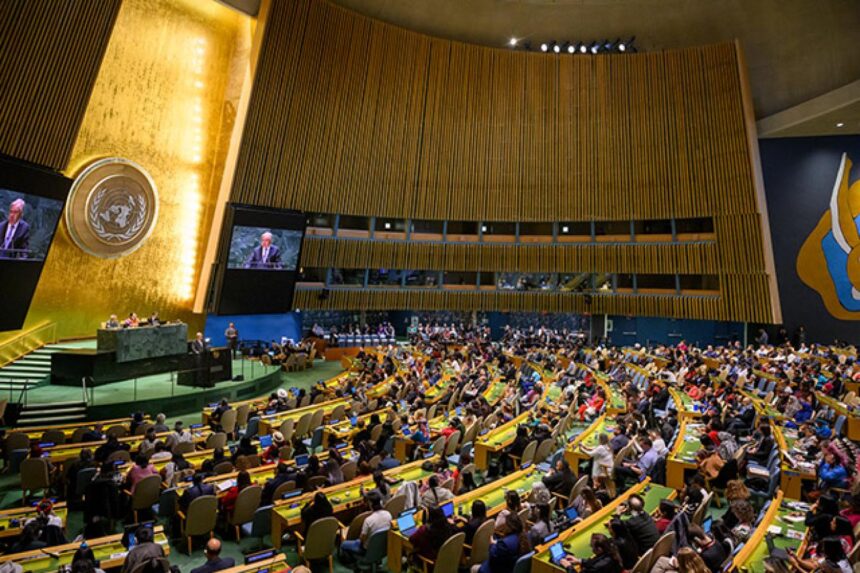A total of 145 countries, including Nigeria, have granted Palestine’s video address request at the 80th Session of the United Nations General Assembly (UNGA).
This comes as 145 countries defied the United States and Israel by backing Palestinian President Mahmoud Abbas to address the high-level debate by pre-recorded video.
The resolution was adopted on September 19, 2025, after an overwhelming 145 votes in favor of Palestine’s video address request.
The resolution passed with 145 in favour, five against (Israel, Nauru, Palau, Paraguay, and the United States), and six abstentions (Albania, Fiji, Hungary, North Macedonia, Panama, and Papua New Guinea).
The development also allows for statements via a live link or pre-recorded video to the high-level conference taking place on the two-state solution, and other high-level meetings.
Aside from granting Palestine’s video address request, the 193-member Assembly also adopted without a vote a Saudi Arabian-proposed decision allowing the Saudi Crown Prince and Prime Minister, Mohammed bin Salman, to deliver a statement by video or pre-recorded message at the high-level conference on 22 September.
Pan-Atlantic Kompass reports that the decision overrides a U.S. visa denial that barred President Mahmoud Abbas from traveling to New York.
Recall that on August 29, the U.S. Department of State announced the revocation of visas for Abbas and approximately 80 other officials from the Palestine Liberation Organization (PLO) and Palestinian Authority, citing national security concerns and allegations of undermining peace efforts.
This move, which drew sharp criticism for violating the UN Headquarters Agreement, prompted an emergency UN General Assembly session to ensure Abbas could still deliver his high-level debate speech.
Meanwhile, the United Kingdom, Canada, and Australia have formally recognised Palestine as a state.
UK Prime Minister Keir Starmer, in a video posted on his official X handle on Sunday, described the development as an effort to “revive the hope of peace” between Palestinians and Israelis.
Starmer said: “We must channel our efforts behind the peaceful future we want to see: the release of hostages, an end to the violence and suffering, and a renewed focus on a two-state solution as the best hope for peace and security.”
Also, Anthony Albanese, Prime Minister of Australia, in a press statement dated September 21, 2025, and posted on his official X handle, said: “Effective today, Sunday 21 September 2025, and alongside our close friends and partners of the United Kingdom and Canada, Australia formally recognises the State of Palestine.
“In doing so, Australia recognises the legitimate and sovereign rights of the people of Palestine to a state of their own, alongside the legitimate rights of the people of Israel to a state of their own. Australia’s recognition of Palestine is an act to build momentum for a two-state solution, starting with a ceasefire and the release of the hostages taken in the October 7, 2023, attacks by Hamas.
“Today’s act of recognition reflects Australia’s longstanding commitment to a two-state solution, which has always been the only path to enduring peace and security for the region. The immediate priorities are clear: an immediate ceasefire; the release of all hostages; a massive increase in humanitarian assistance to relieve the suffering and starvation in Gaza; and a return to meaningful negotiations between Israel and the Palestinians.
“Australia’s recognition of the State of Palestine is not an act of hostility towards Israel. The Albanese Labor Government believes the people of Israel have the right to live in peace and security, free from terror and rocket attacks, just as the people of Palestine have that same right.”
Likewise, Canada’s Prime Minister, Mark Carney said: “Today, Canada recognises the State of Palestine.”





